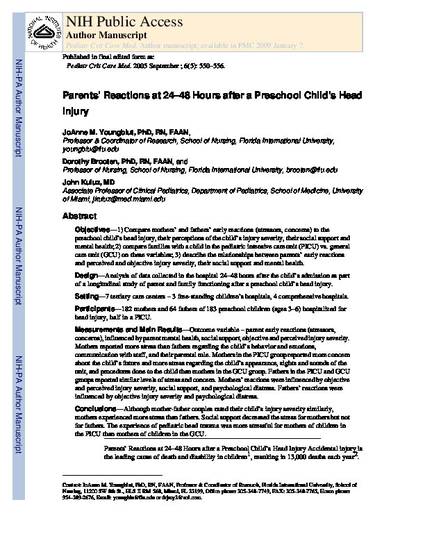
Objectives
1) Compare mothers’ and fathers’ early reactions (stressors, concerns) to the preschool child’s head injury, their perceptions of the child’s injury severity, their social support and mental health; 2) compare families with a child in the pediatric intensive care unit (PICU) vs. general care unit (GCU) on these variables; 3) describe the relationships between parents’ early reactions and perceived and objective injury severity, their social support and mental health. Design
Analysis of data collected in the hospital 24–48 hours after the child’s admission as part of a longitudinal study of parent and family functioning after a preschool child’s head injury. Setting
7 tertiary care centers – 3 free-standing children’s hospitals, 4 comprehensive hospitals. Participants
182 mothers and 64 fathers of 183 preschool children (ages 3–6) hospitalized for head injury, half in a PICU. Measurements and Main Results
Outcome variable – parent early reactions (stressors, concerns), influenced by parent mental health, social support, objective and perceived injury severity. Mothers reported more stress than fathers regarding the child’s behavior and emotions, communication with staff, and their parental role. Mothers in the PICU group reported more concern about the child’s future and more stress regarding the child’s appearance, sights and sounds of the unit, and procedures done to the child than mothers in the GCU group. Fathers in the PICU and GCU groups reported similar levels of stress and concern. Mothers’ reactions were influenced by objective and perceived injury severity, social support, and psychological distress. Fathers’ reactions were influenced by objective injury severity and psychological distress. Conclusions
Although mother-father couples rated their child’s injury severity similarly, mothers experienced more stress than fathers. Social support decreased the stress for mothers but not for fathers. The experience of pediatric head trauma was more stressful for mothers of children in the PICU than mothers of children in the GCU.
Available at: http://works.bepress.com/joanne-youngblut/82/

Author Accepted Manuscript.
The publisher's final edited version of this article is available at Pediatr Crit Care Med